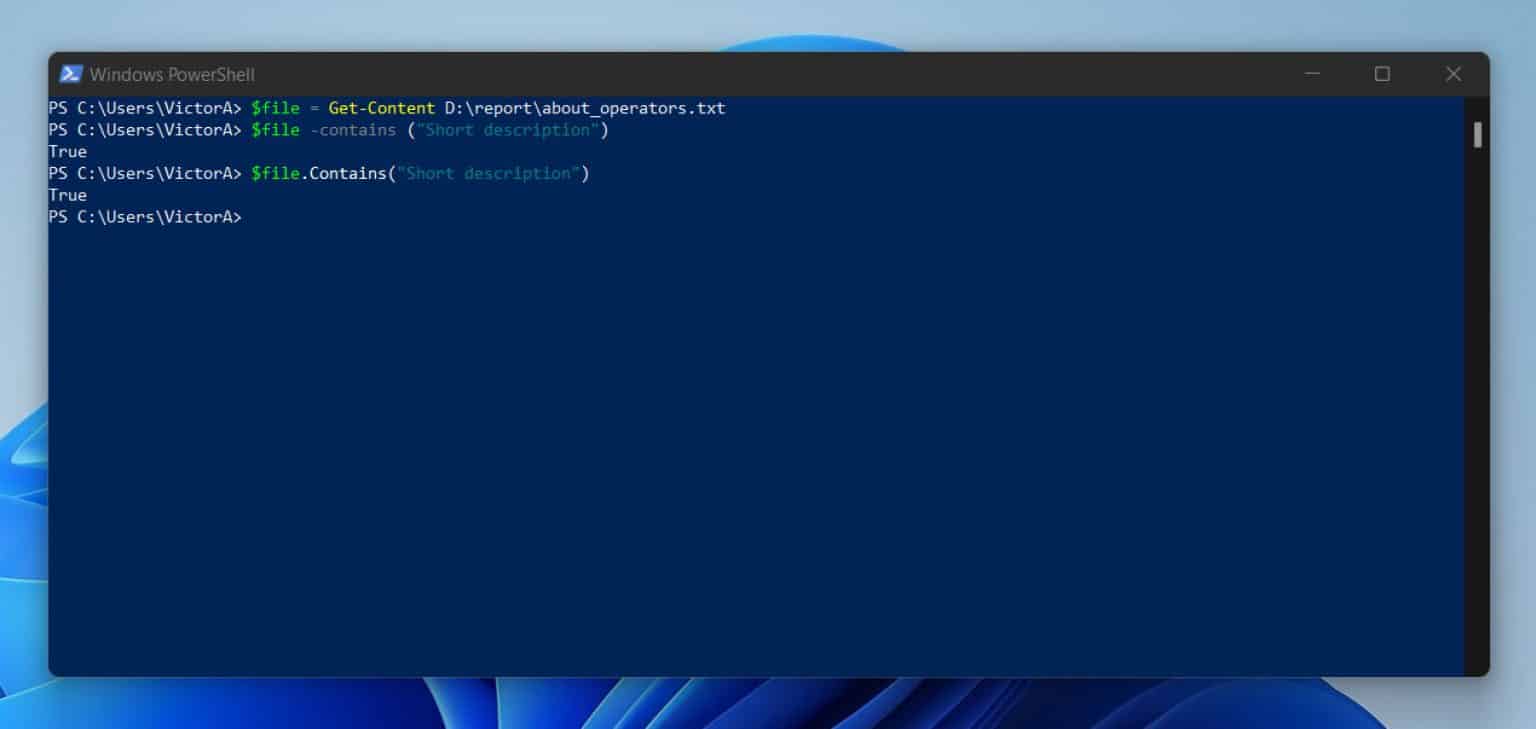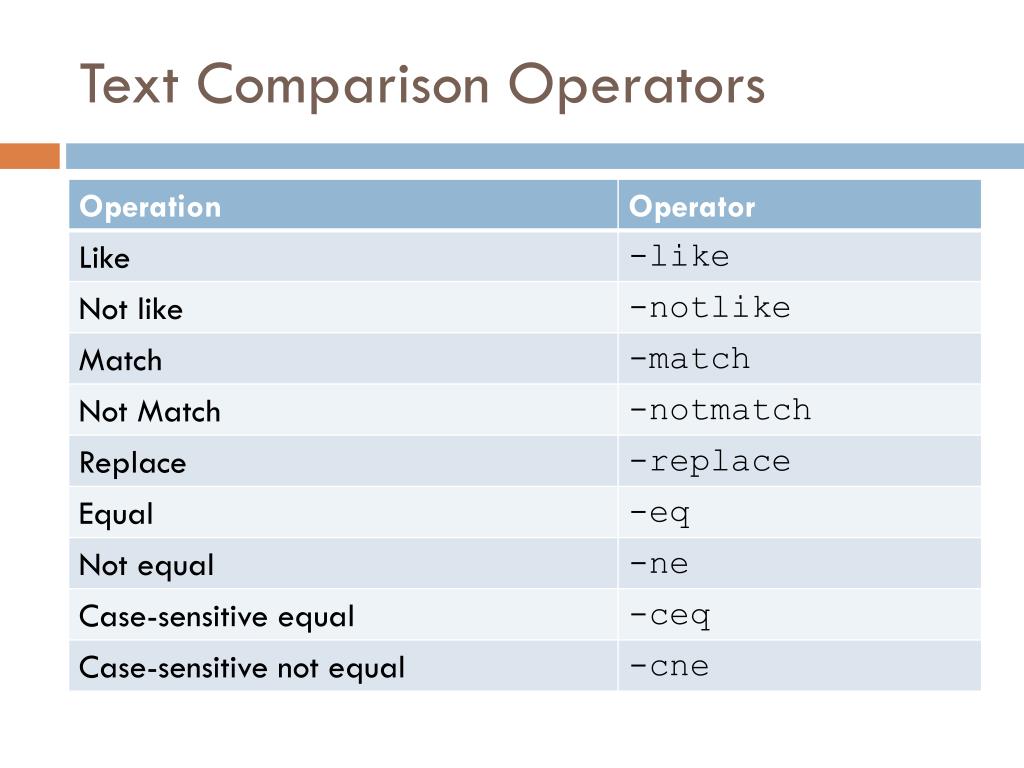
PowerShell Comparison Operators YouTube
PowerShell's comparison operators are symbols or words used to compare two values and return a Boolean (true or false) result. There are a variety of comparison operators available in PowerShell, including equals, not equal, greater than, greater than or equal, less than, and less than or equal.

PowerShell 7 Tutorial 13 Assignment Operators in depth explanation
Here are some examples using matching operators. Open a PowerShell command window and execute these PowerShell commands and see if the results match with what you see here: Command 1: "TechGenix" -like "Genix" and the result will be "True". Command 2: "TechGenix" -like "Genix" and the result will be "False". Command.

Powershell Operators example How do you use operators in PowerShell
The wording in the docs may be ambiguous, but indeed (and sensibly) the only way to make equality comparisons case-sensitive is to use the c -prefixed variant of the -eq operator, i.e., -ceq.
PowerShell Basics Comparison Operators eq ne lt gt Code Examples
In their most basic sense, comparison operators are necessary to evaluate how different things compare to other things. They are used to take two objects and see what the difference (if any) is between those two objects. In PowerShell's case, operators can also be used to find elements inside collections of values.

Powershell Tutorial CH3.1 Comparison Operators YouTube
Here is a basic example of the if statement: PowerShell $condition = $true if ( $condition ) { Write-Output "The condition was true" } The first thing the if statement does is evaluate the expression in parentheses. If it evaluates to $true, then it executes the scriptblock in the braces.

PowerShell 7 Tutorial 15 Logical Operators in depth explanation
A PowerShell Filter will accept the following operators -eq -ne -ge -gt -lt -le -like -notlike -approx -bor -band -recursivematch Notice that this list misses out several useful operators such as -match and -contains but those can still be used by piping to a Where-Object clause:. | Where {$_.name -match 'value'} Examples $demo = $null

PowerShell comparison operators eq, lt, gt, contains, like, match
Module: Microsoft.PowerShell.Core Selects objects from a collection based on their property values. In this article Syntax Description Examples Parameters Inputs Outputs Notes Related Links Syntax PowerShell Where-Object [-InputObject

PowerShell 7 Tutorial 14 Comparison Operators in depth explanation
Using the -Contains or -In Operators. The -contains operator is a PowerShell operator that allows you to check to see if an object is in a collection. The -contains operator natively doesn't understand collections but y0u can build code to make it do your bidding. Let's say a collection (array) contains four strings like below.

Compare Objects with PowerShell (Step by Step Guide)
The PowerShell comparison operators are: -eq (equal to) -ne (not equal to) -gt (greater than) -lt (less than) -le (less than or equal to) -ge (greater than or equal to) -like and -notLike (matching wildcards ), not to be confused with the -contains operator. -match and -notMatch (Matching with regular expressions)

PowerShell Operators Several Types of PowerShell Operators in Detail
For more information on the compare operations in PowerShell, check out these additional resources: Dive deeper into the comparison operators with our comprehensive guide, PowerShell Comparison Operators, covering all the real-world scenarios. This blog post, PowerShell String Comparison, provides examples of string comparisons.

PowerShell Comparison Operators Stephanos Constantinou Blog
The PowerShell Comparison operators are case-insensitive by default. With the -c prefix, you can use the PowerShell case-sensitive Equality Comparison operators, such as -ceq, -cne, -cgt, -cge, -clt, and -cle. Comparison operator -eq. Exchange online enables us to create different types of mailboxes, such as:

PowerShell Contains Operator and Method Explained
The comparison operators also include operators that find or replace patterns in text. The (-match, -notmatch, -replace) operators use regular expressions, and (-like, -notlike) use wildcards *. Containment comparison operators determine whether a test value appears in a reference set (-in, -notin, -contains, -notcontains).

PowerShell Operators Assignment, Arithmetic, Comparison, Logical
Equality Comparison Operators; Logical Operators; Arithmetic Operators. PowerShell arithmetic operators are used to calculate numeric values. These include: Operator. Equality operators in PowerShell are binary operators that compare two integer or string values that return True if the operator condition is met, otherwise False. Operator.

Compare Objects with PowerShell (Step by Step Guide)
PowerShell includes the following comparison operators: Equality -eq, -ieq, -ceq - equals -ne, -ine, -cne - not equals -gt, -igt, -cgt - greater than -ge, -ige, -cge - greater than or equal -lt, -ilt, -clt - less than -le, -ile, -cle - less than or equal Matching -like, -ilike, -clike - string matches wildcard pattern

PowerShell Operators Learn the Different Types of PowerShell Operators
Combining multiple comparison methods in one IF-statement in PowerShell. So I need to check if the field of a variable equals to a certain string. Depending on what team it is, the code does different stuff. The catch is however, that the insert of the team is not standardized. Each member of "Team One" can have team one written in various ways.

PPT PowerShell PowerPoint Presentation, free download ID1544491
As with most scripting languages, in PowerShell you can apply comparison operators to different data types. However, this makes sense primarily for numerical values, although the comparison for strings is possible. In the case of strings, only - eq and -ne are useful to determine equality or inequality.
